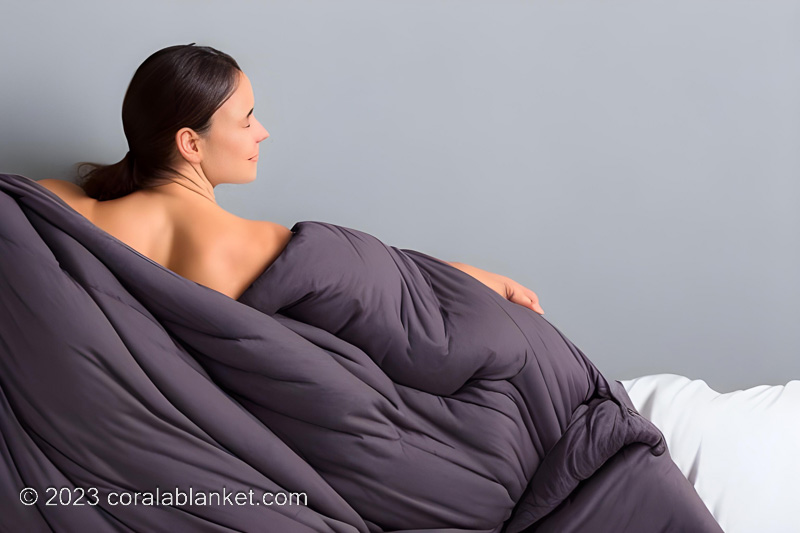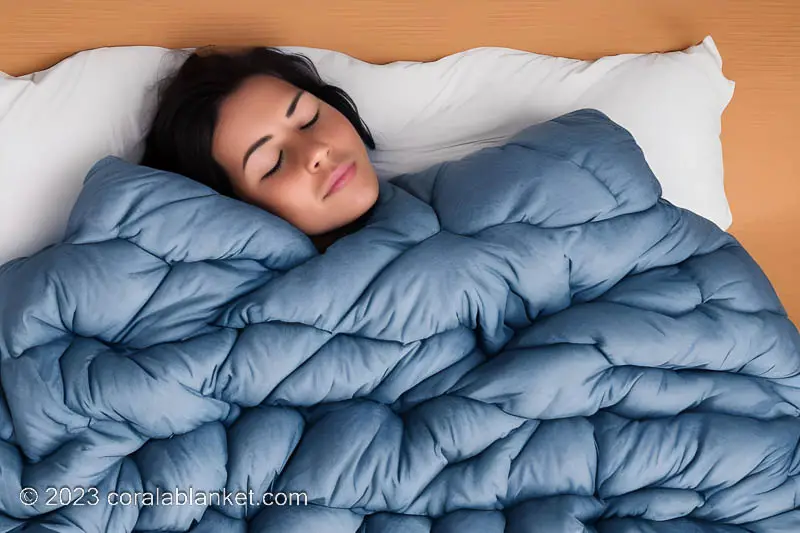Table of Contents
Benefits of Sleeping Without Blankets
We’ve all been there before – trying to sleep in the heat of summer with heavy blankets on top of us. It’s not a comfortable situation.
But I feel a little bit insecure when I try to sleep without any blanket.
Did you know that sleeping without blankets has some benefits?
Here are a few reasons why you should consider giving up your blanket:
Table of Contents
Is it Better to Sleep With or Without a Blanket?
Sleeping without a blanket can have some potential benefits such as improved sleep quality, increased alertness during the day, improved cognitive performance, and regulated body temperature. People who move much during sleep also used to sleep without blankets.
On the other hand, sleeping without a blanket can also lead to a chill, dehydration, and an increased risk of developing a cold or flu.

Why is it hard to sleep without a blanket?
Many of us have grown accustomed to sleeping with a blanket, and it can be difficult to break that habit, especially when the body is conditioned to release melatonin and serotonin when under a blanket. The brain may continue to remind us that something is missing and needs to be resolved before any sleep is possible.
And sleeping without a blanket can lead to feeling too cold, causing a restless and uncomfortable sleep. Dehydration can also occur due to the lack of a blanket to trap moisture. Without a blanket to provide protection from drafts and cold air, our bodies can become more susceptible to germs and viruses.
All of these risks make it difficult to sleep without a blanket.
Why Do Humans Need Blankets to Sleep?
The purpose of sleeping with blankets is to provide physical comfort and also psychological security while promoting quality sleep. Blankets help regulate body temperature during REM (rapid eye movement) sleep, increase levels of serotonin and melatonin which help to relax and calm down, and provide a feeling of protection and security.
Additionally, the presence of a blanket is associated with a sense of familiarity since it has been used since infancy. It is similar to sleeping in small places which offer safety for many people.
Is it good to sleep without a blanket?
While there are some potential benefits associated with the practice, there are also risks associated with sleeping without a blanket and it is important to consider all the potential benefits and risks before making the decision.
There are some people I know who simply love sleeping without a blanket but there is a girl who got very sick on the first week when she tried it. So it’s up to you to try it!
What are the benefits of sleeping with blankets?
The benefits of sleeping with a blanket are numerous. Blankets provide a comforting, warm sensation and can help induce feelings of relaxation and security that can aid in falling asleep. Additionally, blankets help to regulate body temperature, maintaining it at a comfortable level and helping to prevent night sweats. They can also protect against allergens like dust mites and pet dander, which can accumulate in blankets and bedding. Finally, blankets provide an important part of a bedtime routine, helping to signal to our brains that it’s time to wind down and go to sleep.

What are the benefits of sleeping without blankets?
The benefits of sleeping without blankets can include improved airflow, reduced risk of overheating, decreased exposure to allergens, improved sleep quality, increased alertness during the day, improved cognitive performance, faster metabolism, improved skin condition, better regulation of body temperature, less laundry and a reduction of water use and CO2 emissions.
All of these factors contribute to a more restful sleep and a healthier lifestyle.
1. Body temperature decreases quicker
When we naturally start to feel tired and our melatonin production increases, our core body temperature begins to decrease. This decrease in body temperature helps the body conserve energy and signals to the body that it’s time to sleep. If a person sleeps without a blanket, they may be too cold and be unable to reach a deeper level of sleep. A cooler core temperature is optimal for sleeping well, which is why some people believe sleeping without blankets can help the body achieve a cooler core temperature quickly. Without blankets trapping heat against the body, the natural decrease in body temperature is accelerated, signaling to the brain that it is time to rest and promoting better sleep.
2. Improved sleep quality
Sleeping without blankets can improve sleep quality by allowing the body to better regulate its temperature. Warmer temperatures disturb sleep quality as they cause the body to produce more cortisol, the stress hormone. Cortisol can make it difficult to fall asleep and can also lead to chronic stress and other health complications. Colder temperatures, on the other hand, can stimulate the production of serotonin, the relaxation hormone, which helps people how to go to sleep fast and stay asleep for longer. Additionally, cooler temperatures may also help reduce disease risk, slow the aging process, and improve overall mood.

3. Increased relaxation
Sleeping without blankets can increase relaxation because it helps to slow down the heart rate and remove feelings of anxiety. Lowering the nightly core body temperature and increasing serotonin and melatonin levels in the brain can help relax and fall asleep more easily, allowing for a better night’s rest and reducing the symptoms of anxiety and stress.
4. Reduced stress and anxiety
Sleeping without blankets can reduce stress and anxiety by allowing for skin-to-skin contact between partners. This contact releases the hormone oxytocin, which is a feel-good hormone that promotes feelings of safety and love while reducing anxiety.
Just like sleeping naked with a partner which may help to increase self-esteem and a positive body image. As a result, the body is better able to relax, leading to better sleep and a more positive outlook on life.
5. Improved digestion
Sleeping without blankets can improve digestion by regulating the core body temperature. A decrease in body temperature is a natural process that helps the body conserve energy and redirect some energy to the digestive system. The cooler temperatures in the bedroom can also lead to increased melatonin production, which promotes regular menstrual cycles, enhanced moods, weight loss, and cancer-fighting properties.
6. Reduced inflammation
Sleeping without blankets can help reduce inflammation by causing the body to produce more melatonin, a powerful anti-inflammatory hormone. Melatonin helps reduce and prevent inflammation by regulating the body’s immune response, which can help reduce pain and discomfort associated with chronic inflammation. Additionally, cooler temperatures help increase insulin sensitivity, which can help to combat type 2 diabetes and reduce inflammation. Finally, sleeping without blankets can help promote better quality sleep, which can strengthen the immune system and reduce inflammation.
7. Improved weight loss
Study found that sleeping without a blanket can improve weight loss because cooler temperatures during the night can increase metabolic activity by 10% and the production of brown fat by 42%. Brown fat helps the body stay warm without movement, which can lead to burning more traditional fat than if you were to sleep under a blanket.
Secondly, sleeping naked or without blanket can stimulate the release of the hormone serotonin, which helps you to fall asleep faster, stay asleep longer and deeper, and wake up feeling more refreshed and rested.
9. Less grogginess after napping
Sleeping without a blanket can help reduce grogginess in the morning by allowing the body to transition faster from sleep to wakefulness. Without a blanket, the body cools down quickly and the head will be able to think more clearly with fewer minutes of opening one’s eyes.
Are there any risks associated with sleeping without blankets?
Sleeping without a blanket can have some potential benefits, but there are also risks associated with the practice. One of the most common risks is the potential for a chill, as without a blanket to keep you warm, you can become too cold during the night. Another risk is the potential for dehydration, as without a blanket to trap moisture, your skin can become dry and dehydrated.
Finally, sleeping without a blanket can also increase your risk of developing a cold or flu, as without a blanket to protect you from drafts and cold air, your body can become more prone to germs and viruses.
Can you get sick from sleeping without a blanket?
The potential for a chill is higher, as without a blanket to keep you warm, you could become too cold during the night, leading to a restless and uncomfortable sleep. Sleeping without a blanket can increase your risk of developing a cold or flu, as without a blanket to protect you from drafts and cold air, your body can become more prone to germs and viruses. While there is still some debate about the potential benefits of sleeping without a blanket, it is important to consider all the potential risks and benefits before making the decision to do so.
How to make the switch from sleeping with blankets to sleeping without?
Making the switch from sleeping with blankets to sleeping without can seem daunting, but it can be done with the right plan. Here are some steps to make the transition easier:
- Begin by slowly reducing the amount of layers between you and the bed. If you normally sleep with a wool blanket over a comforter, get rid of the wool blanket and gradually adjust to sleeping with just the comforter.
- Once you get used to sleeping with the thinner layer of comforter, reduce the tog rating to a lighter and cooler material.
- Take your time with the transition. Give your brain and body time to adjust to the difference in weight.
- If a total transition from winter bedding to summer bedding feels too much of a shock, transition gradually over a few nights.
- Layer your bedding and adjust what covers you each night.
- If you find it difficult to sleep without a blanket, find ways to cope with the psychological aspect of sleeping with covers. This can involve sleeping with stuffed animals or changing your choice of nightwear.
Following these steps can help make the transition from sleeping with blankets to sleeping without much easier.
FAQs
How can sleeping without blankets help with insomnia?
Sleeping without a blanket can be beneficial for those who suffer from insomnia. Improved airflow, better temperature regulation, and a reduction in allergens can help promote better sleep. Improved airflow, for instance, can help keep your body temperature at a comfortable level throughout the night, leading to a better night’s sleep. Not using a blanket can help reduce the risk of fiver-like overheating and experiencing uncomfortable night sweats.
What is the ideal room temperature for sleeping without blankets?
The ideal room temperature for sleeping without blankets is between 60 and 67 degrees Fahrenheit (15.6 to 19.4 degrees Celsius). This range most closely resembles a natural sleeping environment, and is comfortable for most people. While keeping the temperature within this range is beneficial, individual preferences will vary. Moreover, if you have an infant in the room with you, the temperature should be between 65 and 70 degrees Fahrenheit (18.3 to 21.1 degrees Celsius) for their safety and comfort.
How does sleeping without blankets affect melatonin production?
Sleeping without blankets can affect melatonin production in several ways. First, the body temperature is regulated by the circadian rhythm, and when we sleep without a blanket, our body temperature can drop too low, leading to disruption of the sleep cycle. Secondly, the production of serotonin and melatonin is regulated by the brain, and if we don’t have a blanket to provide comfort, it can be difficult for the brain to send the necessary signals to produce these hormones. Lastly, covering up with a blanket helps the body to relax and promotes better sleep quality by providing the necessary duration of sleep. Therefore, sleeping without a blanket can affect melatonin production, leading to a decrease in overall sleep quality.
What kind of bedding should I use instead of blankets?
If you’re a hot sleeper looking for a way to keep warm without using too much bedding, you should consider swapping out your traditional heavy comforter for a lighter alternative. Silk, bamboo, linen, and other lightweight materials are ideal for staying cool even on the hottest nights. You can also consider using a duvet or a cooling weighted blanket to provide warmth and insulation while still allowing improved airflow. If you’re feeling overwhelmed by the transition, try reducing your blanket weight slowly over the course of a few nights. This way you can keep your body and bedroom temperature just right while staying comfortable.
Finally, bed socks and gloves can replace a blanket and be used to maintain core body temperature while sleeping in a cold room.
Why do I feel safer under a blanket?
Sleeping under a blanket not only makes us feel safe and protected at night, but it also increases our brain’s serotonin levels and decreases the presence of stress hormones.
Blankets also allow us to control our environment and give us a sense of comfort and relaxation. Finally, when we sleep under a blanket, our brains associate it with rest and sleep, allowing us to drift off into a deep slumber.
Autistic people like to sleep with a blanket over head which is especially feels good as it gives more security and control.
- 10 Dreamy Victorian-Inspired Bedroom & Sleepwear Sets - May 13, 2025
- 10 Best Cottagecore Bedroom Sets With Matching Sleepwear - May 13, 2025
- Why Leopard Print Makes Perfect Sleep-To-Style Moments - May 13, 2025

